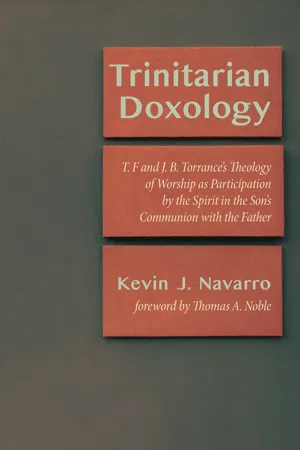
eBook - ePub
Trinitarian Doxology
T. F and J. B. Torrance's Theology of Worship as Participation by the Spirit in the Son's Communion with the Father
- 228 pages
- English
- ePUB (mobile friendly)
- Available on iOS & Android
eBook - ePub
Trinitarian Doxology
T. F and J. B. Torrance's Theology of Worship as Participation by the Spirit in the Son's Communion with the Father
About this book
Most approaches to liturgical theology are anthropocentric: the study of liturgy is primarily focused on what we, the worshipers, do. Thomas F. Torrance and James B. Torrance offer a trinitarian and christocentric approach. This informs not only the "why" of worship and not simply the "what" or "how" of worship, but centers on the One whom we worship. Most significantly, it fully recognizes the key role of the humanity of Christ as the ascended High Priest who alone offers the perfect worship and through whom alone we are enabled by the Spirit to worship God.
Frequently asked questions
Yes, you can cancel anytime from the Subscription tab in your account settings on the Perlego website. Your subscription will stay active until the end of your current billing period. Learn how to cancel your subscription.
No, books cannot be downloaded as external files, such as PDFs, for use outside of Perlego. However, you can download books within the Perlego app for offline reading on mobile or tablet. Learn more here.
Perlego offers two plans: Essential and Complete
- Essential is ideal for learners and professionals who enjoy exploring a wide range of subjects. Access the Essential Library with 800,000+ trusted titles and best-sellers across business, personal growth, and the humanities. Includes unlimited reading time and Standard Read Aloud voice.
- Complete: Perfect for advanced learners and researchers needing full, unrestricted access. Unlock 1.4M+ books across hundreds of subjects, including academic and specialized titles. The Complete Plan also includes advanced features like Premium Read Aloud and Research Assistant.
We are an online textbook subscription service, where you can get access to an entire online library for less than the price of a single book per month. With over 1 million books across 1000+ topics, we’ve got you covered! Learn more here.
Look out for the read-aloud symbol on your next book to see if you can listen to it. The read-aloud tool reads text aloud for you, highlighting the text as it is being read. You can pause it, speed it up and slow it down. Learn more here.
Yes! You can use the Perlego app on both iOS or Android devices to read anytime, anywhere — even offline. Perfect for commutes or when you’re on the go.
Please note we cannot support devices running on iOS 13 and Android 7 or earlier. Learn more about using the app.
Please note we cannot support devices running on iOS 13 and Android 7 or earlier. Learn more about using the app.
Yes, you can access Trinitarian Doxology by Kevin J. Navarro in PDF and/or ePUB format, as well as other popular books in Theology & Religion & Christian Rituals & Practice. We have over one million books available in our catalogue for you to explore.
Information
The Biographical Background of T. F. and J. B. Torrance
Table of contents
- Title Page
- Foreword
- Preface
- Acknowledgements
- Introduction
- Chapter 1: The Biographical Background of T. F. and J. B. Torrance
- Chapter 2: Unitarian or Trinitarian Worship?
- Chapter 3: The Trinitarian Faith and Worship
- Chapter 4: The Mediation of Christ
- Chapter 5: The Place of Jesus Christ in Liturgical Prayer and Worship
- Chapter 6: T. F. Torrance and Preaching
- Chapter 7: The Sacraments of Incorporation and Renewal
- Bibliography